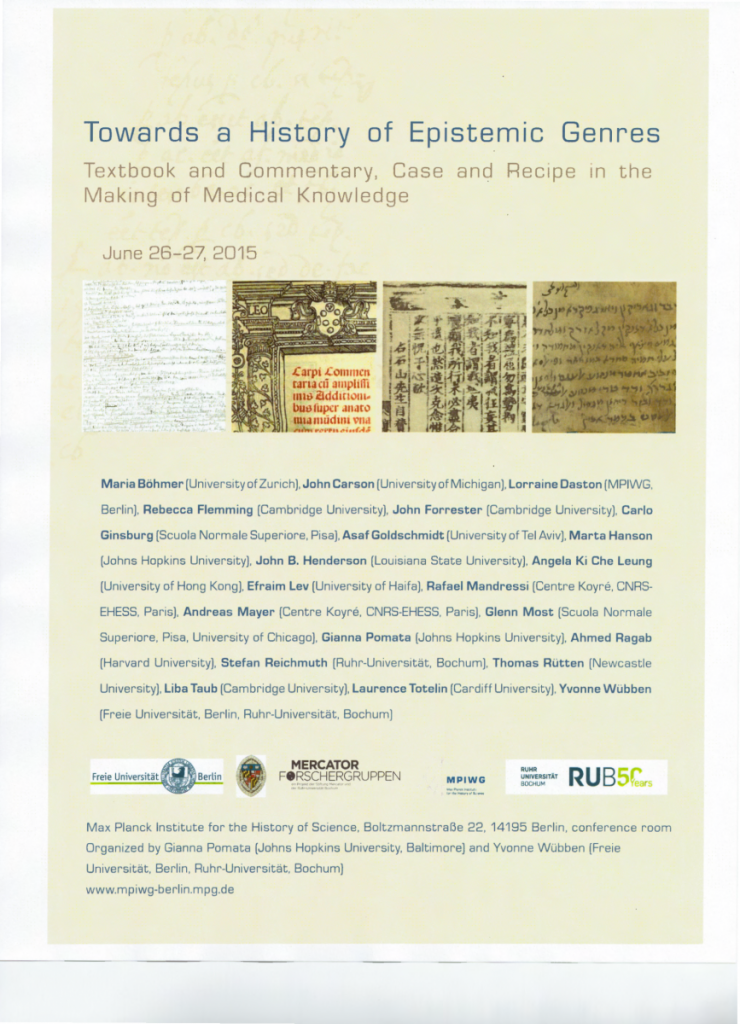June 26, 2015
12:00am
Prof Gianna Pomata has co-organized a confernence titled “Towards a History of Epistemic Genres: Textbook and Commentary, Case and Recipe in the Making of Medical Knowledge”, which will take place 26-27 June at the Max Planck Institute of the History of Science.
This conference will explore the role of genres in the production and transmission of scientific knowledge, focusing on four basic textual forms: the textbook, the commentary, the case and the recipe. All these genres (with the exception of the recipe) have featured significantly in many disciplinary fields, from the law to natural philosophy, from moral philosophy to medicine. But it is especially in medicine that the four of them (the recipe included) have played a fundamental role, often in synergy with each other. So our conference will look specifically at these genres in the making and transmission of medical knowledge.
At the same time, we hope that the conference will contribute to a wider effort of thematizing the role of genres in scientific practices more in general. To this purpose, we propose a distinction between literary and epistemic genres. A cognitive dimension may be part of most forms of writing, but that does not mean that all texts have primarily a cognitive purpose: texts can be related to a wide range of human activities, of which knowledge-making is just one aspect. When we speak of epistemic genres, we mean specifically those kinds of texts that develop in tandem with practices of knowledge-making (however culturally defined). We invite historians of medicine, science and technology as well as literary scholars to consider the distinction between literary and epistemic genres as a useful heuristic tool.
Program
JUNE 26, morning session
8:45-9:00 Gianna Pomata and Yvonne Wübben: Welcome and introductory remarks
I. Transmitting, adapting, and recording practice: the recipe
Chair: Gianna Pomata (Johns Hopkins University)
Commentator: Elaine Leong (MPIWG, Berlin)
Speakers:
9:00-9:45 Laurence Totelin (Cardiff University): Castoreum or the testicle of the Istrian beaver: ingredient presentation strategies in ancient recipes
9:45-10:30 Efraim Lev (University of Haifa): Recipes between prescriptions and formulas – theory vs. practice in medieval Arabic medicine according to the Cairo Genizah
10:30-11:15 Stefan Reichmuth (Ruhr-Universität, Bochum): Probata, tables and diagrams: standardised recipes in Arabo-Islamic medicine and magic
11:15-11:30 COFFEE
11:30-12:15 Ahmed Ragab (Harvard University): Tajarib, formularies and the making of medical thinking in Medieval Islam
12:15-1:00 Marta Hanson (Johns Hopkins University): Genre-blending in Chinese medicine: when formulas (fang) and Secrets of the Pulses (Maijue) came together (14th to 16th centuries)
1:00-2:30 LUNCH
Afternoon session
II. Between practice and theory: the case
Chair: Andreas Mayer (Centre Koyré, CNRS-EHESS, Paris)
Commentator: Carlo Ginzburg (Scuola Normale Superiore, Pisa)
Speakers:
2:30-3:15 John Forrester (Cambridge University): Revisiting “Thinking in cases”: the case of ‘Agnes’
3:15-4:00 Asaf Goldschmidt (University of Tel Aviv): Reasoning with cases: the transmission of clinical medical knowledge in twelfth-century Song China
4:00-4:15 COFFEE
4:15-5:00 Gianna Pomata (Johns Hopkins University): A science of individuals: focusing on the patient’s “particular nature” in pre-modern European medical case collections
5:00-5:45 Maria Böhmer (University of Zurich): Transgressing disciplines and genres: a medical case on the move in 19th-century Europe
5:45-6:15 General discussion on the morning and afternoon sessions
7:30 DINNER
JUNE 27, morning session
III. Transmitting and transforming theory: the commentary
Chair: Yvonne Wübben (Freie Universität, Berlin, Ruhr-Universität, Bochum)
Commentator: Glenn Most (Scuola Normale Superiore, Pisa, University of Chicago)
Speakers:
9:00-9:40 Rebecca Flemming (Cambridge University): Ancient medical commentaries: identity, pedagogy, and knowledge
9:45-10:30 Thomas Rütten (Newcastle University): Hippocrates commentaries: a neglected epistemic genre of the late Renaissance
10:30-10:45 COFFE
10:45-11:30 John B. Henderson (Louisiana State University): Chinese medical commentaries
11:30-12:15 Angela Ki Che LEUNG (University of Hong Kong): Unraveling a modern disease framed in the classics: the strategy of Zeng Chaoran’s ‘Jiaoqi chuyan’ (‘Preliminary words on the Leg-qi ailment’, 1887, Canton)
12:15-2:00 LUNCH
JUNE 27, afternoon session
IV. Transmitting and codifying knowledge: the textbook
Chair: Carlo Ginzburg (Scuola Normale Superiore, Pisa)
Commentator: John Carson (University of Michigan)
Speakers:
2:00-2:45 Rafael Mandressi (Centre Koyré, CNRS—EHESS, Paris): From commentary to textbook: textual practices and epistemic projects in early 16th-century anatomy
2:45-3:30 Lorraine Daston (MPIWG, Berlin): Cloud atlases and the physiognomy of the sky
3:30-3:45 COFFEE
3:45-4:30 Yvonne Wübben (Freie Universität, Berlin, Ruhr-Universität, Bochum): Textbook, treatise, manual: a history of psychiatric genres
4:30-5:15 Andreas Mayer (Centre Koyré, CNRS-EHESS, Paris): Textbook psychoanalysis – an impossible genre?
5:15-5:45 General discussion on the morning and afternoon sessions
5:45-6:15 Liba Taub (Cambridge University): Concluding remarks
Please register until 24 June 2015 per email: ute.hoffmann@rub.de (Ute Hoffmann)
Contact: Yvonne Wübben, Institut für Deutsche und Niederländische Philologie, FU Berlin, Habelschwerdter Allee 45
